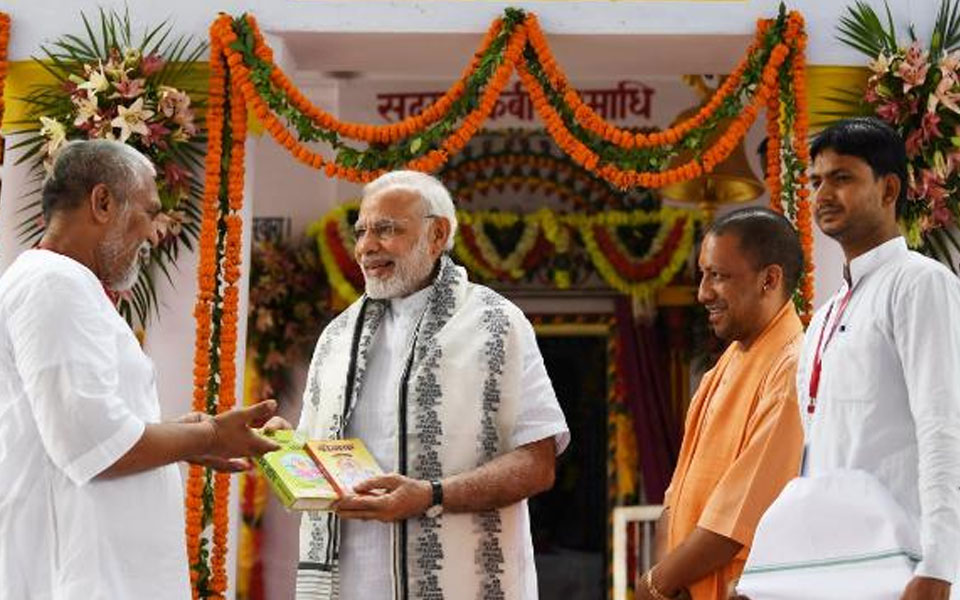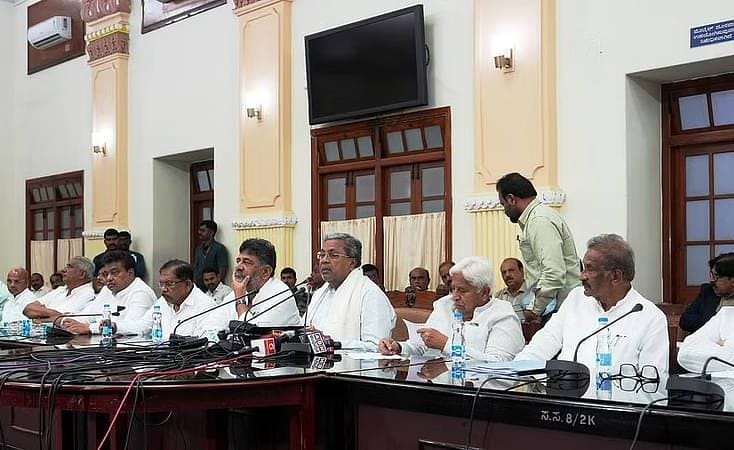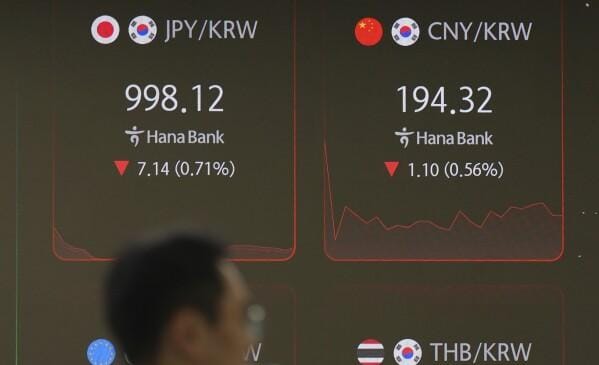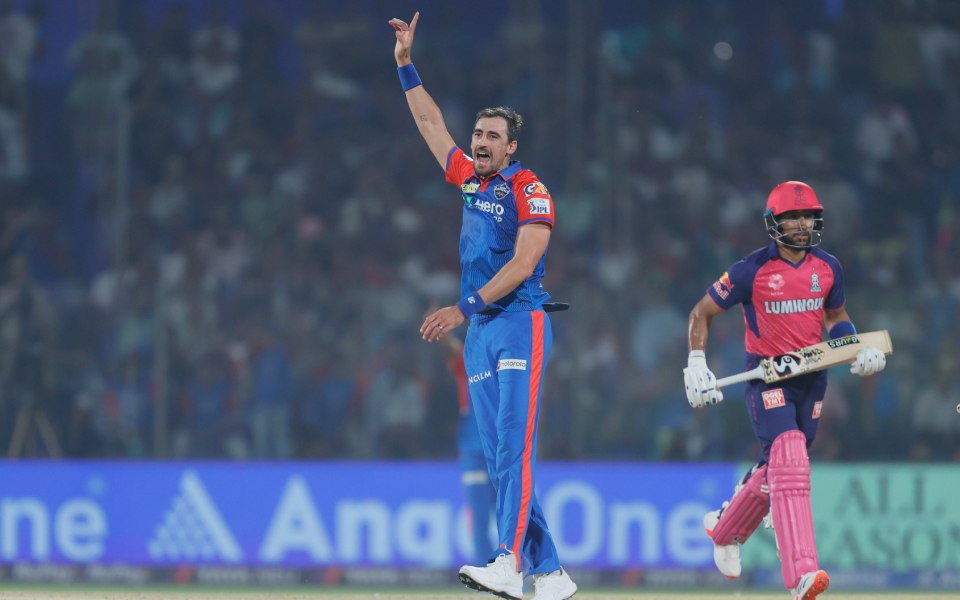New Delhi : Prime Minister Narendra Modi has his critics. And they have taken potshots at some of his policy decisions and his penchant for getting historical facts wrong.
In Maghar this morning there was a sense of déjà vu.
Modi reached Maghar, Uttar Pradesh, on the occasion of the 620th anniversary of Kabir. He first paid his obeisances to Kabir and on his mausoleum offered a chadar (a ceremonial cloth).
Modi addressed a public meeting in the presence of UP Chief Minister Yogi Adityanath and other BJP leaders.
Mahatma Kabir's reflection upon equanimity and harmony has given direction to the society for centuries. I once again salute him who hailed from this land of nirvana. It is said that here, Saint Kabir, Guru Nankadeva and Baba Gorakhnath sat together and discussed spirituality.
- Said Modi addressing Maghar rally
Modi critics were quick to pounce upon the Prime Minister for getting his facts wrong, again. The three belonged to different eras and maybe PM Modi got his history slightly mixed up.
PM MODI MAKES HISTORY
Baba Gorakhnath's belongs to an earlier era than Kabir and Guru Nanak. Baba Gorakhnath was born in the 11th century while Kabir, who lived for 120 years, was born at the end of the 14th century (1398 to 1518).
Guru Nanak lived between the 15th century and the 16th century (1469-1539).
Guru Nanak bumping into Kabir has an element of probability but they both pondering over spirituality is stretching things a bit too much.
NOT THE FIRST TIME PM MODI HAS MADE HISTORY
This is not the first time that Modi has made such a mistake of mashing-up facts when it comes to history.
Back in 2013, Narendra Modi at a rally in Patna, talking about "power of Bihar" mentioned emperor Ashok, Pataliputra, Nalanda, along with Takshshila; except for the minor issue of Takshila was in Punjab (now in Pakistan) and not Bihar.
At a speech in the US, PM Modi spoke of the Sun Temple of Konark being 2,000 years old; the fact: the famous temple is only 700 years old.
Modi once said that when we talk of the Gupta empire, it reminds us of Chandragupta's politics. But if he was referring to politics did he mean Chandragupta who belonged to the Mauryan empire. Chandragupta II was lived during the Gupta empire.
courtesy : indiatoday.in
Let the Truth be known. If you read VB and like VB, please be a VB Supporter and Help us deliver the Truth to one and all.
Bengaluru (PTI): Amid what appears to be a caste conundrum, the Karnataka cabinet will hold a special meeting on Thursday to discuss the contentious Socio-Economic and Education Survey report, popularly known as 'caste census'.
According to official sources, the cabinet is considering referring the report to a cabinet sub-committee or an expert committee for further examination.
With Siddaramaiah already indicating that the report will be debated in both houses of the state legislature, sources said it may also be referred to a joint legislative committee. There is also the possibility of convening a special session of the legislature.
The cabinet is likely to deliberate on the report’s recommendation to increase OBC reservation in the state from the current 32 per cent to 51 per cent, sources said adding that the demand for a fresh survey or recounting may also come up.
Several communities, especially Karnataka's two dominant ones -- Vokkaligas and Veershaiva-Lingayats -- have voiced strong objections to the survey, terming it "unscientific". They have demanded that the report be rejected and a fresh survey be conducted.
Objections have also been raised by various sections of society, including from within the ruling Congress party.
However, not all voices are critical. Several leaders and organisations representing Dalits and OBCs among others are in support of it and want the government to release it, pointing out that about Rs 160 crore of public funds has been spent on the exercise.
Given the strong disapproval from the two politically influential communities, the report may turn out to be a political hot potato for the government, as it may set the stage for a confrontation with Dalits and OBCs among others demanding its release and implementation.
The survey's findings are said to be at odds with the "traditional perceptions" of the caste composition in Karnataka, especially the numerical strength of Veerashaiva-Lingayats and Vokkaligas, making it a politically sticky issue. Ministers from these communities are expected to voice their objections during the cabinet meeting, sources said.
Both Veershaiva-Lingayats and Vokkaligas and a few other communities have claimed that their sub-castes have been divided among different categories of OBC, resulting in a decrease in the population. They have alleged that many households were left out from the survey or undercounting.
Amid growing opposition to the survey report, the CM had on Wednesday assured that his government would not let any injustice happen to anyone.
After a long wait, the Karnataka State Commission for Backward Classes' report was placed before the cabinet for the first time on April 11.
The Siddaramaiah-led government (2013-2018) had in 2015 commissioned the survey in the state.
The State Backward Classes Commission, under its then chairperson H Kantharaju, was tasked with preparing a caste census report. The survey work was completed in 2018 towards the end of Siddaramaiah's first tenure as Chief Minister, and the report was finalised by his successor K Jayaprakash Hegde in February 2024.





